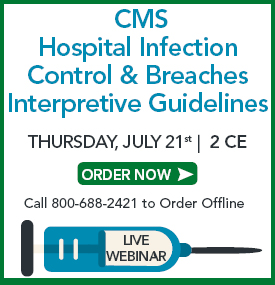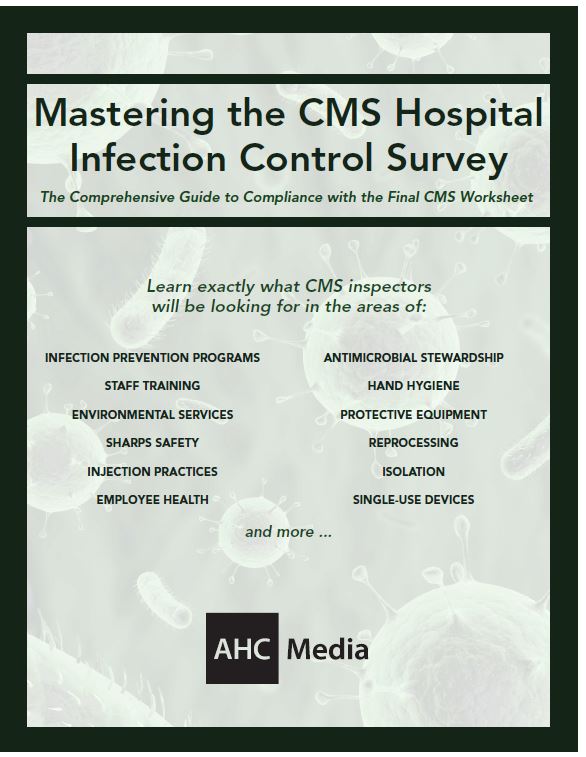Compliance Mentor - June 2016
|
Free Monthly News from the Award Winning Publisher of: |
||||
|
Hospital Access Manage- ment |
Hospital Case Manage- ment |
Hospital Employee Health | Hospital Infection Control |
Hospital Peer Review |
|
Health- care Risk Manage- ment |
Case Manage- ment Advisor |
IRB Advisor |
Medical Ethics Advisor |
Same- Day Surgery |
New Department of Labor Rule Changes Overtime Exemption Requirements
The U.S. Department of Labor (DOL) issued a final rule increasing the salary threshold for overtime exemptions. The rule, which goes into effect December 1, will affect healthcare workers employed by the federal government, such those as in Veterans Administration hospitals.
The minimum annual salary requirement for overtime exemption will increase to $47,476 from the current $23,660. Hourly workers, non-managers, and lower wage earners will have to be paid 1.5 times the hourly wage if they work more than 40 hours a week – a level that will be adjusted every three years. Employers can give non-discretionary bonuses and commissions up to 10% of the salary level. The new rule does not change overtime exemptions for executive, administrative, and professional employees, according to the DOL fact sheet.
To prevent potentially costly wage claims, employers must ensure that all managers and human resources personnel are properly trained to ensure nonexempt employees are following proper timekeeping procedures. The DOL plans to issue three technical guidance documents to educate employers and staff.

AHRQ Clarifies Immunity Provisions of the Patient Safety Act
The Agency for Healthcare Research and Quality’s (AHRQ’s) Office for Civil Rights released guidance to clarify questions healthcare organizations may have on the immunity provisions of the Patient Safety and Quality Improvement Act of 2005.
The purpose of the Patient Safety Act is to establish a system where healthcare providers can voluntarily collect patient safety data, known as the patient safety work product (PSWP), to send to patient safety organizations (PSOs) for analysis and feedback. This data is protected against discovery procedures in malpractice and wrongful death suits against hospitals. However, adverse event data collected through mandatory reporting requirements, such as through the Centers for Medicare & Medicaid Services (CMS), are not protected through the Patient Safety Act. AHRQ noted some providers have classified information as PSWP when it does not meet the definition, then refused to disclose the information.
The new AHRQ guidance clarifies what data are and are not considered PSWPs, when information can be removed, and clarifies that patient medical records, billing, and discharge information are not protected. AHRQ also developed an educational video called Working with a PSO: One Approach that can help providers set up a patient safety evaluation system when working with a PSO.

HHS Final Rule Prevents Sex, Transgender Discrimination; Enhances Language Services
The U.S. Department of Health and Human Services (HHS) issued its final rule expanding nondiscrimination requirements. The 99-page rule, which goes into effect on July 18, implements Section 1557 of the Affordable Care Act (ACA), prohibiting discrimination of patients on the basis of sexual orientation or gender identity. The rule also enhances language assistance for patients with limited English proficiency (LEP).
Patient discrimination is already prohibited on the basis of race, color, national origin, sex, age, or disability in certain health programs and activities. The final rule applies to any health program or organization that accepts Medicare and Medicaid patients. Among other provisions, transgender patients will be permitted to enter a hospital ward or restroom consistent with the patient’s gender identity.
In addition to sex discrimination protections, the rule also provides greater assistance to patients with LEP. Interpreters must be provided for critical communications, and key documents can be translated into the patient’s native language. Hospitals and covered entities are required to post notices about communication and language assistance. Insurers who provide coverage through Healthcare.gov are also required to comply with the rule.
It is estimated that training and administrative costs for state and federal agencies will be $960 million dollars. Hospitals should have legal counsel and administrative review this rule carefully.
Summary and fact sheets are available at the Office of Civil Rights website.

EEOC Releases Final Rules on Employer Wellness Program Incentives
The Equal Employment Opportunity Commission (EEOC) updated regulation governing the use of employee data in employer-sponsored wellness programs with the release of two final rules. The rules clarify how employer wellness program data collection can comply with the Americans with Disabilities Act (ADA) and the Genetic Information Nondiscrimination Act (GINA). The rules go into effect in January 2017.
In the first rule, the EEOC provides guidance on the extent to which employers may offer incentives to employees to participate in wellness programs that ask them to answer disability-related questions or undergo medical examinations. The incentives cannot be so high as to be coercive, thus creating the risk of the program being involuntary. Programs may include incentives to walk 10,000 steps a day or attend a smoking cessation class, and will be permitted as long as they are available to all individuals and incentives are made regardless of health status. The wellness program would need to provide an alternative or waiver if the person cannot participate or achieve program goals due to a disability. The rule clarifies that if an employee is required to be enrolled in a health plan in order to participate in the wellness program, the incentive to the employee cannot exceed 30% of the total cost for an employee.
The second rule addresses the use of incentives to employees for providing a spouse’s genetic information as part of the wellness program. An employer may offer a limited incentive in the form of a reward or penalty to an employee whose spouse receives health or genetic services offered by the employer. The service that collects genetic information must make sure it is reasonably designed to promote health or prevent disease. The maximum incentive for a spouse’s participation cannot exceed 30% of the total cost of self-only coverage, which is the same incentive allowed for the employee.
The employer can only collect information for a wellness program in aggregate form that does not disclose the identity of the individual except as necessary to administer the plan. The employer cannot require the employee to agree to the sale, exchange, or transfer of medical information or to waive confidentiality protections. The individual must be informed of what information will be collected as part of the wellness program.

|
UPCOMING HOSPITAL WEBINARS Live + On Demand Access with Continuing Education Credits |
|||||
|---|---|---|---|---|---|
|
New Pharmacy & Medication Standards: |
Sign Up → | |||
|
Grievances and Complaints: Compliance with CMS, TJC & DNV Standards |
Sign Up → | |||
|
Transitional Planning Under New and Proposed CMS Guidelines |
Sign Up → | |||
|
Federal Laws and Regulations Crucial to Every Healthcare Facility |
Sign Up → | |||
|
Uncovering Patient Safety and the 'Just Culture' Theory |
Sign Up → | |||
|
CMS Hospital Infection Control Revised Worksheet Guidelines |
Sign Up → | |||
|
CMS Hospital Infection Control & Breaches Interpretive Guidelines |
Sign Up → | |||
|
Ensuring Compliance with the Provision of Care Standards |
Sign Up → | |||
|
Chronic Conditions: What We Need to Know to Help |
Sign Up → | |||
FEATURED RESOURCES





